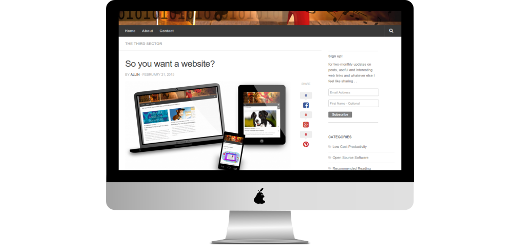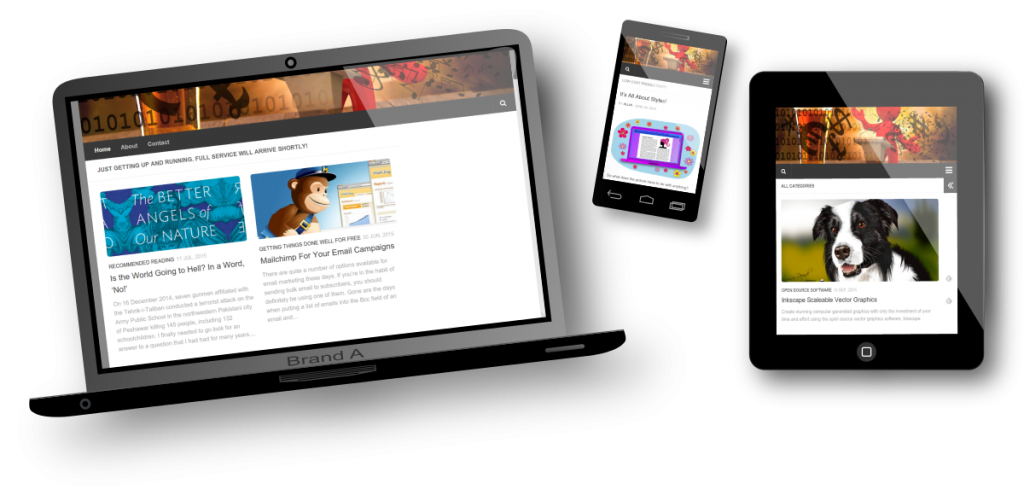
… and branded email stationary and a Facebook campaign and Twitter and … and …
And a real question is, ‘WHY?’
It’s true that nobody is anybody these days without a website and any self-respecting organisation doesn’t do business without it being a point of contact and information, even if the main body of communications happens elsewhere, such as on social media. It’s become the new landline. Time was that you couldn’t trust a business if it didn’t have a landline but that, I think, is disappearing. Fixed phone lines are becoming more and more irrelevant to people’s lives: they would much rather ring a mobile number that fits in their billing plan. However it’s now reaching the point that a business without its own website is in some way considered not bona fide.
But again, why do you want a website? It’s a really good question to ask. I grew up with the phrase, ‘What’s the point?’, in my vocabulary although it was brow-beaten out of me at school. I discovered it again in later life and still use it with myself rather a lot although, with other people, I tend to translate it as it’s seen as being unthinking and negative. For me it’s not negative and certainly not unthinking. It is a question that just cuts to the chase. I like to work and like to have little side-projects on the go but there always has to be an end-point or a goal, even if I’m just doing something in order to learn how to do it. I really don’t like to work where I don’t understand the outcome, the reason for doing something, the point!
So what’s the point here? I’ll get to it (at long last!). The point is is that a website (and social media campaigns etc.) exist to create a real-world outcome. That outcome might be money changing hands and a product being shipped, something being transferred virtually and installed on a computer, people managing their lives better based on good advice or just someone feeling happy that they have put their thoughts out into the world. So when we want a website, we are looking for it to achieve something in the real world and that is our starting point for the whole process. ‘Start with the end in mind’ as the man says. We must see the change that will come about in the real world and then see how (or even if) a website and all the accoutrements will bring about that change. Keeping in mind that we’re hopefully working from a philanthropic point of view here, working backwards we need to ask:
- What will be different in the world – what is our goal?
- How will we enable people to do the thing we want them to do?
- How will we convince people to do the thing we want them to do?
- What will people do when they see / hear / interact with our content? (The thing we want!)
- What is it that people might want to know, see, read, hear in order to arrive at a decision to do what we want them to do?
- How will people find, hear about, be encouraged to engage with our content?
- How much will it all cost and is it worth it – is there a better way to spend our resources?
This website, for instance, has a number of things that it aims to accomplish in the real world:
- It is a place for me to put my thoughts out in the world. I have lots of them and like to put them somewhere.
- It is a place for me to promote my beliefs about how the world should be. I believe that we can reach a largely post-capitalist world where the basics of life are free and people work to fulfil their own vision. Free software and the third sector are good places to start in that.
- It’s also a place for me to promote myself and my own work, involve myself in projects and gain some extra paid work for the things that interest me. In advance of reaching post-capitalism, that still has to remain an aim.
And so, I write about the things that I do and the things that I am interested in and present the work that I do. That’s my point here.
And so all this is to say that ‘we need a website’ is usually a very correct statement when starting out with something new or continuing with something ongoing. But the real-world consequences are what matter and if we focus on those, then the website will do our work for us.
That thought works for lots of other things too! Let’s bring the question, ‘What’s the point in that?’, in from the cold so we can always work towards one in the best possible manner.

